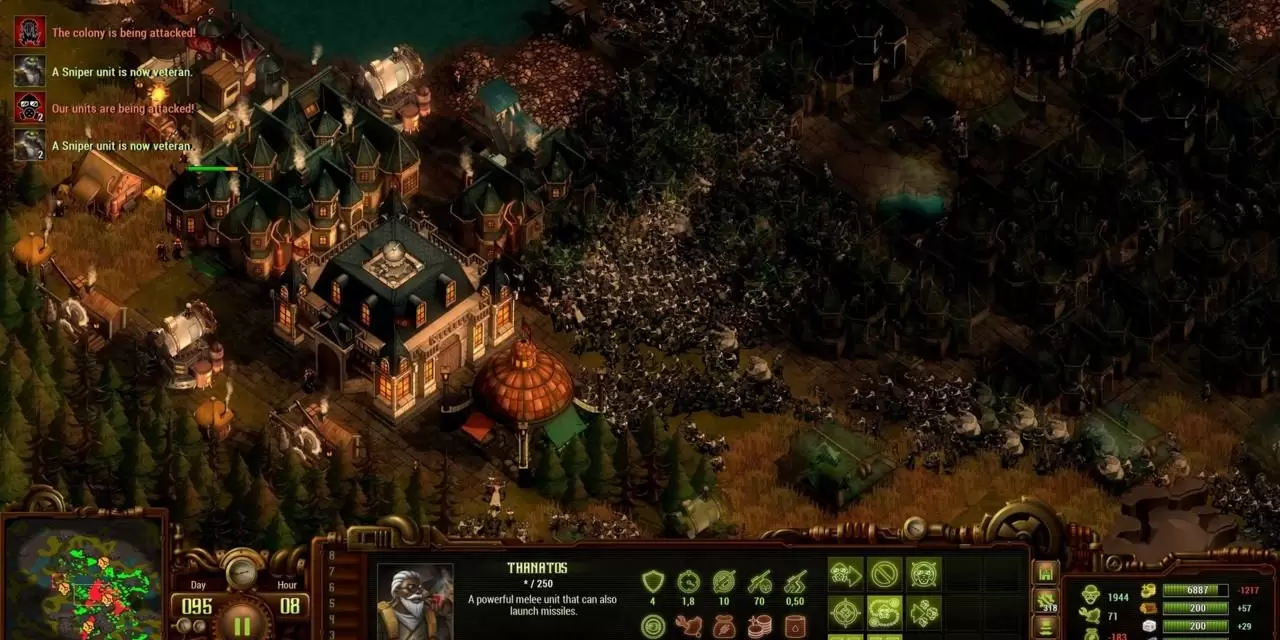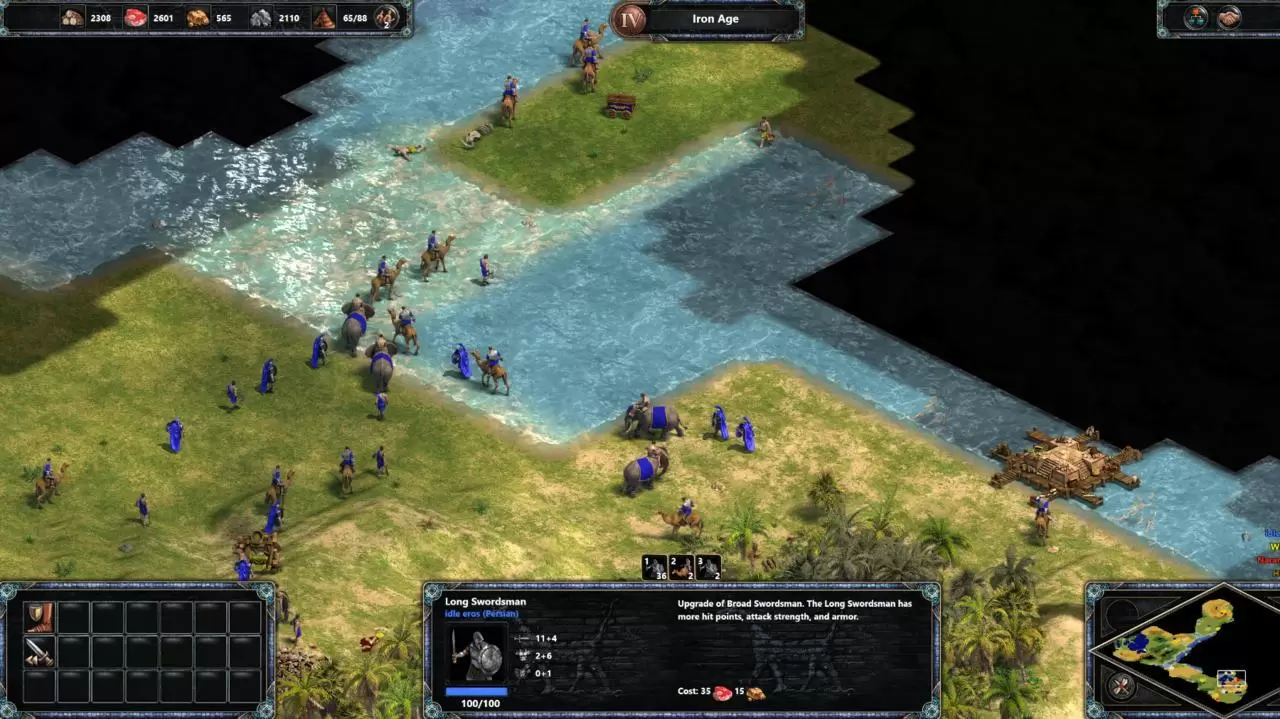
They Are Billions Review

Part tower defense, part city builder, They Are Billions is a real-time strategy game whose flow swings between cautious turtling as you hunker down to fend off the zombie hordes and well-considered dashes to expand your territory and exploit vital new resources. Introduced into Steam Early Access last year with a survival mode that challenged you to endure a certain number of days on a randomly-generated map, the game now features a hand-crafted campaign mode as part of its Version 1.0 release. The result is a hybrid RTS that shines when it plays to its strengths even if several of its new additions feel like unnecessary distractions.
When you first start a new map and see your isolated base surrounded by zombies, the game’s title will feel accurate, if an understandable exaggeration. Stray zombies take refuge in the fog of war, milling around in small groups until you alert them and occasionally shambling towards your settlement. There aren’t really billions, but it looks like there could be. Fifteen days later, the klaxon blares to signal the arrival of the horde and soon, as a seemingly relentless river of undead lay siege to your defenses, you start to suspect billions may well be an understatement.









The survival mode and the majority of maps in the campaign offer a similar experience. First, you establish a perimeter with patrol routes to pick off encroaching zombies, scout the immediate area to identify chokepoints and nearby resource deposits, build structures around your base to grow the economy, and secure it all with enough troops and fortifications to fend off the first wave of attack. Survive that, and the second step is an expeditious land-grab to claim whole swathes of fertile new ground, clearing away the errant undead and managing your production to generate all the resources required to populate and work your expanded colony.
The ebb and flow at play here is lovely. The arrival of each new wave of zombies is clearly signposted, so you always know precisely how many days you have to prepare for the attack. How you use that time is where the interesting strategic choices arise. Weighing up whether it’s wise to expand northward towards the iron that will let you build soldiers or eastward, where there’s a large forest that provides natural cover and wood required to repair fencing and guard towers; such choices arrive with every wave and your prospects for surviving the next one hinge on the decisions you make.
It’s incredibly tense, too. Outside of the horde attacks, a single zombie that manages to elude your patrols and wander into your settlement can mean game over. If just one manages to attack a dwelling, everyone inside will become infected and proceed to join the assault, multiplying the danger to unmanageable levels in an instant. Death is swift. I lost entire colonies thanks to my failure to spot a gap in my defensive setup. Next thing I know, death is spreading across the camp and weeks of desperate survival count for nothing.

Survival mode is based around permadeath, as you’d expect. But the campaign, too, incorporates various degrees of permadeath and iron-man elements in an effort to force you to accept the consequences of your choices. If you get overrun and fail a campaign mission, for example, you have to restart that mission from the beginning rather than reload a save from mid-mission before it all started to go wrong. There’s even a penalty applied to the mission reward for each time you fail. Somewhat ironically, an option to back up your campaign save has been added since its 1.0 launch, and the developer has indicated it may continue to adjust its approach in this area in future updates, which makes these decisions feel unconfident.
The campaign falters with the inclusion of survival elements, which don’t mesh well with the flow of exploration. The campaign maps are hand-crafted–they’re the same every time you play them. They are, essentially, puzzles in which the solution is discovered through increasingly efficient resource management. Most of the maps here deliver satisfying challenges, and the permadeath aspect punishes you for experimentation within these maps. When you know you messed up between 60 and 65 days, having to restart from day zero can be tough to swallow.
The campaign fares better as a more gentle introduction to They Are Billions. The tech tree locks away many of the game’s structures, units, and bonuses behind research points accumulated by completing missions. This means the early missions let new players learn the ropes by only having to worry about a handful of buildings and a couple of units, rather than potentially overwhelming them with too many concepts to understand at once. As a new player myself, I also appreciated the adjustable difficulty settings which let you advance more slowly through the research tree while at the same time serving up missions that let you progress with the lesser tech at your disposal. Then, once I was comfortable, I was able to bump up the difficulty to match my improved skills.
Adding variety to the campaign are a couple of non-traditional mission types. There are Hero missions in which you control just one unit infiltrating a small base and Swarm Attack missions that are pretty barebones tower defense skirmishes. The elimination of much of the base-building and economic management–or indeed all of it in the case of the Hero missions–exposes the remaining combat as shallow. Worse, stripping out the core mechanics simply misses the whole point. As a result, neither of these mission types are particularly enjoyable, and quickly become irritations you have to wade through to get to the proper missions. Adding variety for variety’s sake, in this case, only serves to diminish rather than enhance.
At its best, though, in both the original survival mode, across the bulk of the campaign and in the one-off challenge of the week maps, They Are Billions remains a tight and compelling strategy game. The knowledge that you’re always just one misstep away from disaster creates a gripping, tense atmosphere that’s unusual for the genre. And the cycle from defense to offense and back again as you progress from one wave to the next offers both well-paced urgency and the ability to set clear short-term goals. It’s a smartly designed game at its core, despite the distractions. Just like a lone zombie can bring about your demise, sometimes one strong idea is enough.
Source:: GameSpot Reviews


















